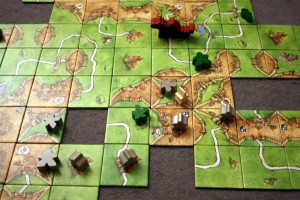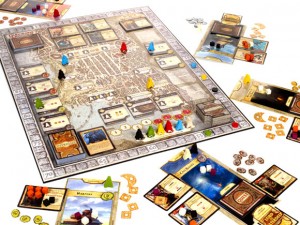 Its important, as someone who purports to be a game designer, to play games. Not just the latest AAA shooter or the latest games-as-art indie game, but a whole breadth of games (the good and the bad).
Its important, as someone who purports to be a game designer, to play games. Not just the latest AAA shooter or the latest games-as-art indie game, but a whole breadth of games (the good and the bad).
In this post I want to focus on a specific area of gaming that has recently being holding my free time, and my wallet, captive; board games.
I’ve been inspired to write this, in large part, by Noel Llopis’ article – Board Games: My New (Old) Love.
But I hate Monopoly

Remember playing Monopoly and Cluedo with your family as a kid? Maybe you get Monopoly out every so often at Christmas and its seems a little, well… crap! The experience no longer seems relevant now that we’re entertained by streams of data and cutting edge digital experiences. You probably feel that board games are a vestige of times gone by. Nobody plays board games anymore right?
Here’s something I found out recently – board games didn’t die. They went underground and continued without us, getting better with time. Not a little bit better, a lot better. The underground scene can’t contain them anymore. They’re bursting out into mainstream, threatening to permeate our vapid digital experiences with something fresh, new, and engaging.
My board game history
It all started for me a few years ago when I read about Carcassonne (I forget where, perhaps mentioned in some game design article). It was a classic example of the so called Euro board game (basically referring to Germany). The imagery was stuffy and trite but the game was anything but. I found a game about shared exploration and building; a game where winning was not the goal.

Carcassonne is a simple game. The rules are largely there to describe the point scoring system (which is also fairly simple). If you want to give board games a try, herein lies your first hurdle. When I first played Carcassonne I thought it was the most complicated thing ever. You need to persist. Rules are not baked into board game design, as with video games, instead you must invest time up front, learning to play before you can actually play.
After Carcassonne I moved onto other Euro games – Ticket to Ride, Agricola, etc. Each one was highly enjoyable (more so than the boxes could ever convey). Tactile, high quality playing pieces and really unique gameplay mechanics won me over. I thought that was it, but as I read about these games I stumbled upon the wider board game community. Those aforementioned Euro games are the equivalent of video games’ AAA titles. It turns out that there are literally thousands of other really good thematic games with unique gameplay. When you start digging you realise just how huge the hobby really is. It will blow your mind.
Where I am now
I’m currently in a phase I’m going to call “addiction”.
Thankfully I’m extremely level headed and have given myself a limited amount of space to store my board games. This helps me to ensure that I don’t end up with an apartment full of board games. Ok, this is a lie. My Wife has limited my hobby to a small cupboard ;)
I’m narrowing in on my favourite gameplay mechanics – worker placement and card drafting games.
Worker placement is where you place pieces onto spaces that represent a specific action you wish to take. Usually there is only a finite number of actions and once taken these cannot be used by another player that turn. Our current favourite is Lords of Waterdeep which has just the right amount of theme with the worker placement mechanic being implemented masterfully.

Card drafting is drawing cards from a pool and creating a hand from them. Many games have card drafting elements to them. Currently we’re enjoying both Citadels and Dominion. Dominion is incredibly fast paced and varied whilst citadels has a really simple city building mechanic wrapped up in a limited set of extremely interactive cards.

I’ve only scratched the surface of the hobby and I’m just starting to engage with the Board Game Geek community (through forums and the likes).
Why you should care as a game designer
Gameplay mechanics – Board games lay their gameplay mechanisms bare. The inner workings are presented in plain sight for everyone to see and understand.
When you need to collect a card at random, you shuffle the pack and select one. Likewise, luck-based decisions are often made by rolling dice (A rand() function before your very eyes!).
Dismantling the gameplay and figuring out how the systems interact is lots of fun. The physicality of the board games makes this a much more transparent and satisfying experience.
Constraints – More and more, in digital game design, I’m putting in place deliberate constraints in order to create interesting experiences.
Board games are teaching me that its the constraints that make a game interesting. The game has to fit on a table. Visual representations are limited by cost. Actions are generally limited. The gameplay generally has a time limit/strict win condition. etc.
They’re generally very tight experiences and at the end of the day they have to fit back into a small-ish box.
Diversity – There is so much diversity in board game design. Literally any theme you can think of has a handful of board games. Its not just the themes either. Established board game mechanics often get turned on there heads – for instance, the rotating wheel in the recent Tzolk’in: The Mayan Calendar.
Board games about horse racing, building train tracks, pandas eating bamboo, defending castles, making food, building spaceships… there truly is something for everyone.
Multiplayer – Board games have a true social aspect to them. Honestly, I think this is one of their most positive attributes. They encourage a group of people to sit down and focus on something together (both co-operatively and competitively).
Board games have nailed local multiplayer in a way that video games never have.
Give your eyes a break – You write video games as your job or hobby but if you’re anything like me you still have a yearning to play games in your down time.
The problem I have is that what I don’t want to do is stare at screen. Board games solve this dilemma beautifully. Knowing that you get to enjoy a game without having to look at yet another screen is a massive boon.
Some suggestions
If you feel inspired to give board games a go (and I strongly recommend that you do), first start with some classics. Games like The Settlers of Catan, Ticket to Ride, and Carcassonne are good introductions to the hobby. They demonstrate good design, are readily available, and will hopefully do enough to hook you.
Once you’re past this point, check out Board Game Geek and look out for games that catch your eye (The top list is a good place to start). Initially you may just want to look out for eye-catching designs or perhaps you could focus on individual gameplay mechanics you enjoyed in the aforementioned games. The community is extremely helpful so don’t be afraid to ask (I can be found here: https://boardgamegeek.com/user/pitpony)
As you branch out, try to explore some of the key mechanics present in modern board games. Like video games, popular gameplay mechanisms are copied and iterated upon in other games. Look out for good examples and try the crazier stuff too.
In conclusion
I think that board games suffer from the same image problem that video games did until relatively recently. Shows such as TableTop and to a large extent Shut Up & Sit Down are helping to break through this barrier.
Ultimately though, you should just take the plunge. You’ll have a great time, I promise.
Have some fun and enjoy exploring your new hobby away from a screen :)
(p.s. hide your wallet)